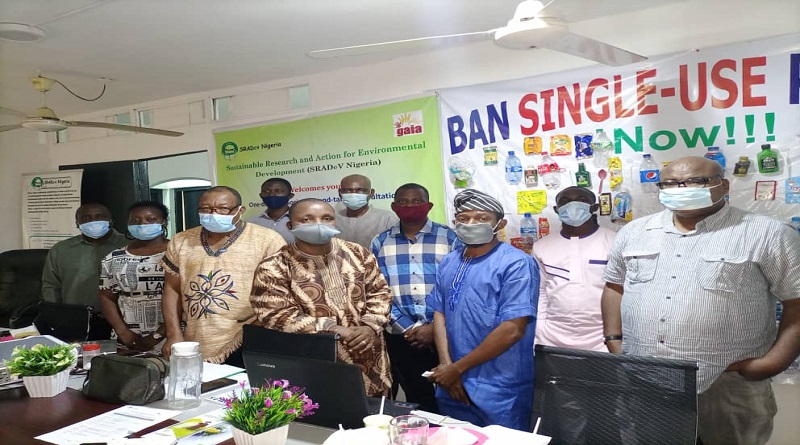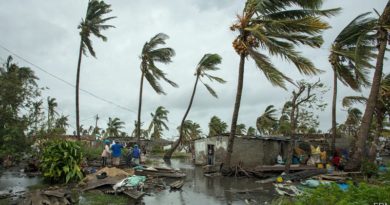Campaigners urge FG to domesticate Basel Convention Amendment
Civil society group under the aegis of International Pollutants Elimination Network (IPEN) and Global Alliance for Incinerator Alternatives (GAIA) Nigeria members, have called on the Federal Government to urgently domesticate the Basel Convention Amendment which came into effect on 1st January 2021.
The group in a communique issued at the end of a one-day Civil Society Round-table Consultation on Plastic Waste Policy held in Lagos on 29th January 2021, organised by Sustainable Research and Action for Environmental Development (SRADev Nigeria) with financial support of GAIA also recommended that the National Environmental Regulation of NESREA for the plastic sector should be reviewed in line with Basel Convention Amendment gaps analysis identified.
Essentially, the workshop aimed to get input of civil societies (IPEN and GAIA Nigeria members) on the experts gap analysis of the national policy on plastic waste management in conjunction with Basel Convention Amendment as part of the deliverables of the mini-project titled “Targeted Advocacy on the National Policy on Plastics Waste Management and the Transposition of the Basel Convention Amendment in Nigeria”.
The forum attended both virtually and physically by participants drawn mainly from civil society, academia and the media, to make input into the national policy on plastic as well as to develop a national action plan towards tackling the menace of plastics in Nigeria received a goodwill message delivered by Sirine Rached of GAIA.
Participants observed that the core principles and recommendations of the Basel Convention plastic waste amendments are missing in the National Policy; the Nigeria National Policy has not addressed the issues of trade in plastic waste even though the new Basel Convention plastic waste trade rules will become effective on 1 January 2021; the Policy does not recognise that significant amount of imports and exports of plastic waste do occur in Nigeria; the national policy on plastic waste management does not indicate the role of key government parastatals in the management of plastic waste, especially the control of trans-boundary movement of plastics and its waste, for example the Nigerian Customs and that standardisation is a critical requirement for effective implementation of the plastic waste amendments and this would require the involvement of Standards Organisation of Nigeria (SON).
However, following the detailed review and discussions on the two experts report (Prof P.C. Onianwa, Basel Convention Coordinating Centre for African Region (BCCC-Africa) and Prof B.I. Alo, Chemistry Department, University of Lagos), recommended the following:
- Urgent need for the domestication in Nigeria of the Basel Convention Amendment which came into effect in January 1st, 2021.
- The National Environmental Regulation of NESREA for the plastic sector should be reviewed in line with Basel Convention Amendment gaps analysis identified.
- Urgent need for very specialized technical trainings for key enforcement officers to be conducted for officials of Customs, NESREA, NPA and FMENV and few other stakeholders on aspects of the enforcement and permitting procedure relating to plastic waste trade as well as Basel Convention Amendment domestication.
- Government to immediately establish the concentrations of contaminants in the plastic wastes and accredit specialize institutions and laboratory training for analysis of plastics for contaminants.
- The permitting system of the Federal Ministry of Environment should be overhauled to establish preparedness for the Prior Informed Control (PIC) system for plastic waste as required by the Basel Convention Amendment.
- There is need for a national inventory on plastic waste-based fuel in the country and its compliance with best practice.
- The Federal Government through the Federal Ministry of Environment should immediately declare its stand to the international community on the question of the inclusion of cured resins and fluorinated polymers in Annex IX of the Basel Convention.
- There is need for studies to assess institutional capacity of the entire plastic waste management sector and make available information on plastic additives.
- There is an urgent need for the immediate phase-out of single-use plastic such as Styrofoam, disposable plastics cups, and straws etc as against the proposed 2028 deadline proposed in the National Policy.
- There is need for a national inventory on the availability of replaceable alternatives to single-use plastic.
- Federal Government should put in place be the right-to-know mechanism on the chemical constituents (in consultation with SON, FCCPC, MAN, NCS) of plastic waste nationally and internationally traded in the country.
- Awareness creation, capacity building particularly for the government agencies, civil societies, media as well as the international traders (importers and exporters) and other relevant key stakeholders in the plastic waste value chain to understand the issues of plastic waste.
The group resolved to advance the process for government engagement towards the transposition of the Basel Convention Amendment in Nigeria through: media sensitization through media conference and social media engagements on the core principles and recommendations of the Basel Convention in the policy; a written justification to the Federal Ministry of Environment as well as other relevant government parastatals to advocate the inclusion of the plastic waste policy amendment and the formation of a GAIA-IPEN coalition on corporate accountability of plastic waste to engage with major industry stakeholders through the Food and Beverage Recycling Alliance (FBRA) and others in the plastic recycling sector.




